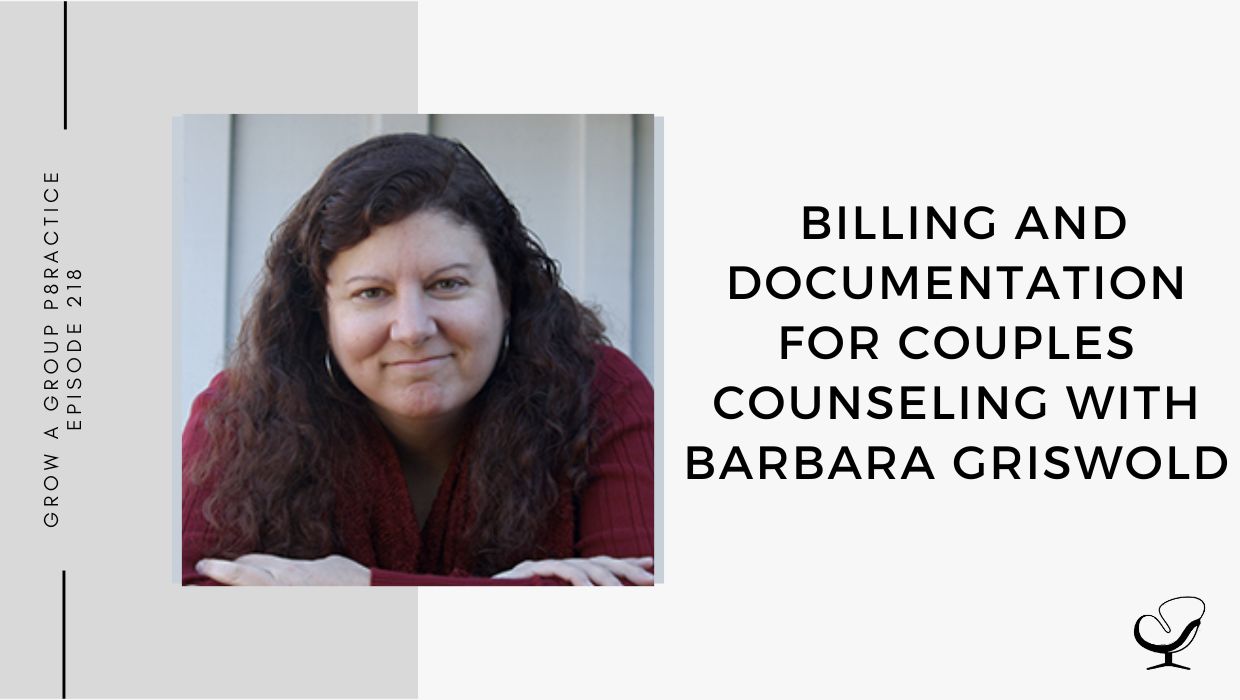Podcast (group): Play in new window | Download | Embed
Do you see couples in your private practice? How should you bill couples counseling to insurance to get a higher rate? What should you document throughout your sessions?
In this podcast episode, Andrew Burdette speaks about billing insurance and documentation for couples counseling with Barbara Griswold.
Podcast Sponsor: Therapy Notes

As a therapist, I can tell you from experience that having the right EHR is an absolute lifeline. I recommend using TherapyNotes. They make billing, scheduling, notetaking, telehealth, and E-prescribing incredibly easy. Best of all, they offer live telephone support that’s available 7 days a week.
You don’t have to take my word for it – Do your own research and see for yourself – TherapyNotes is the #1 highest-rated EHR system available today, with 4.9 out of 5 stars on Trustpilot.com and on Google.
All you have to do is click the link below, or type promo code JOE on their website www.therapynotes.com, and receive a special 2-month trial, absolutely free.
If you’re coming from another EHR, TherapyNotes will import your demographic data quickly and easily at no cost, so you can get started right away.
Trust me, don’t waste any more of your time, and try TherapyNotes.
Meet Barbara Griswold

Barbara is a Licensed Marriage and Family Therapist. With over 28 years of experience as a therapist, she provides support and practical feedback to help you effectively address the challenges you are facing in your life.
In addition, Barbara provides consultations to therapists about insurance-related issues, writing progress notes, practice building, handling the business side of a practice, and giving case consultations. Visit her personal website and The Insurance Maze. Connect on LinkedIn.
In This Podcast
- When you can and can’t bill for couples when it comes to insurance
- Documentation throughout treatment
- Why are couples’ insurance reimbursement rates lower than individuals’?
- How to document couples counseling
When you can and can’t bill for couples when it comes to insurance
Whenever you work with insurance and want to bill insurance, even for an individual, there’s something called “medical necessity” that has to be believed to be present. That means that there has to be a diagnosis, and what you’re doing has to be believed to be helping that diagnosis. It can’t usually just be a Z code … Like “marital problems” … So that Z63.0 is not going to cut it for insurance plans. (Barbara Griswold)
Billing insurance for couples counseling can be tough because you need to show medical necessity, so the standard codes that you may use would not be sufficient to get those sessions covered.
Most insurance plans only cover medical diagnoses, which is something you need to consider.
Three things need to be present in couples to be able to bill insurance:
1 – A person in the couple who is covered by insurance and has a diagnosis, like an adjustment disorder or an anxiety disorder
2 – Do you believe that what you are doing in any way can reduce the symptoms of that diagnosis?
3 – You do not need to approach your treatment plan with one person in the couple as the identified patient, but you do need to do that to get through to insurance. As long as you operate within the boundaries of the insurance, you can make it flexible here and there.
[Many therapists will say], “I want to make it more about the relationship. The relationship is my goal, it’s not about reducing the symptoms of the one person”, and I get that … But I think … Insurance plans are much more flexible as long as we’re in the ballpark. (Barabara Griswold)
Documentation through treatment
Just because you’ve wrapped up your original goals doesn’t mean that the treatment doesn’t continue to be medically necessary. (Barbara Griswold)
The client, even while a portion of the goals have been fulfilled, may still be impaired, distressed, or now has new goals that they want to achieve. So, throughout treatment, it’s necessary to ask:
- Does this client still have symptoms?
- Does this client have an impairment?
- Are they just chitchatting because they’re enjoying therapy?
Why are couples’ insurance reimbursement rates lower than individuals’?
It makes no sense that couples therapy is reimbursed at a lower rate in insurance than what they reimburse for individual sessions since the therapist is navigating two people in the room.
Barbara explains that she thinks it’s because of two reasons;
1 – For some reason, insurance companies officially gave the title of 50 minutes per session for couples whereas in the individual section there is an official choice of 45 minutes or 60 minutes
2 – The couples counseling code goes all the way down to 26 minutes. You can bill the same amount and be paid the same amount all the way down to 26 minutes
What I wish they had done … is we have on the individual side … [Codes] for different lengths, I totally wish they had done this with couples … and then I think we would’ve had a 60 minute couples session, then they would’ve paid more for it. (Baraba Griswold)
How to document couples counseling
The good and bad thing about it, as Barbara explains, is that there isn’t an eloquent way to do it.
Everyone does it differently … You just need to have a way to cross reference with the partner who might have a different last name and you have to search for [them]. It depends on your electronic health record, it depends on whether you’re seeing the partner individually too … So sometimes you need to set up a separate record. (Barbara Griswold)
It’s really a case-by-case situation. Of course, check with your state for any specific regulations and consult with other therapists to see what they’re doing if you need some specific guidance.
Books mentioned in this episode:
Barbara Griswold – Navigating the Insurance Maze: The Therapist’s Complete Guide to Working With Insurance — And Whether You Should
Useful links mentioned in this episode:
- Visit Barbara’s personal website and The Insurance Maze. Connect on LinkedIn.
- Trust me, don’t waste any more of your time, and try TherapyNotes.
Check out these additional resources:
- Offering Intensives with Stacey Curnow | GP 217
- Practice of the Practice Network
- Group Practice Launch
- Group Practice Boss: www.practiceofthepractice.com/grouppracticeboss $149 a month
- PoP Group Practice Owners Facebook Group
- Free resources to help you start, grow, and scale
- Work with us
- Practice of the Practice Network
Meet Andrew Burdette

Andrew founded Mindful Counseling PLLC in Asheville, NC shortly after completing his graduate program in clinical mental health counseling. At the start of the pandemic, he pivoted to an online solo practice, and in 2022, began to grow a group practice. He most enjoys helping clients and colleagues identify what ignites their passions and assisting them in creating a life rooted in authenticity. Andrew approaches his business development with alignment in mind and enjoys the integration process connecting the many puzzle pieces and systems required to run a successful practice.
Visit Andrew’s website and Apply to work with him.
Email him at [email protected]

